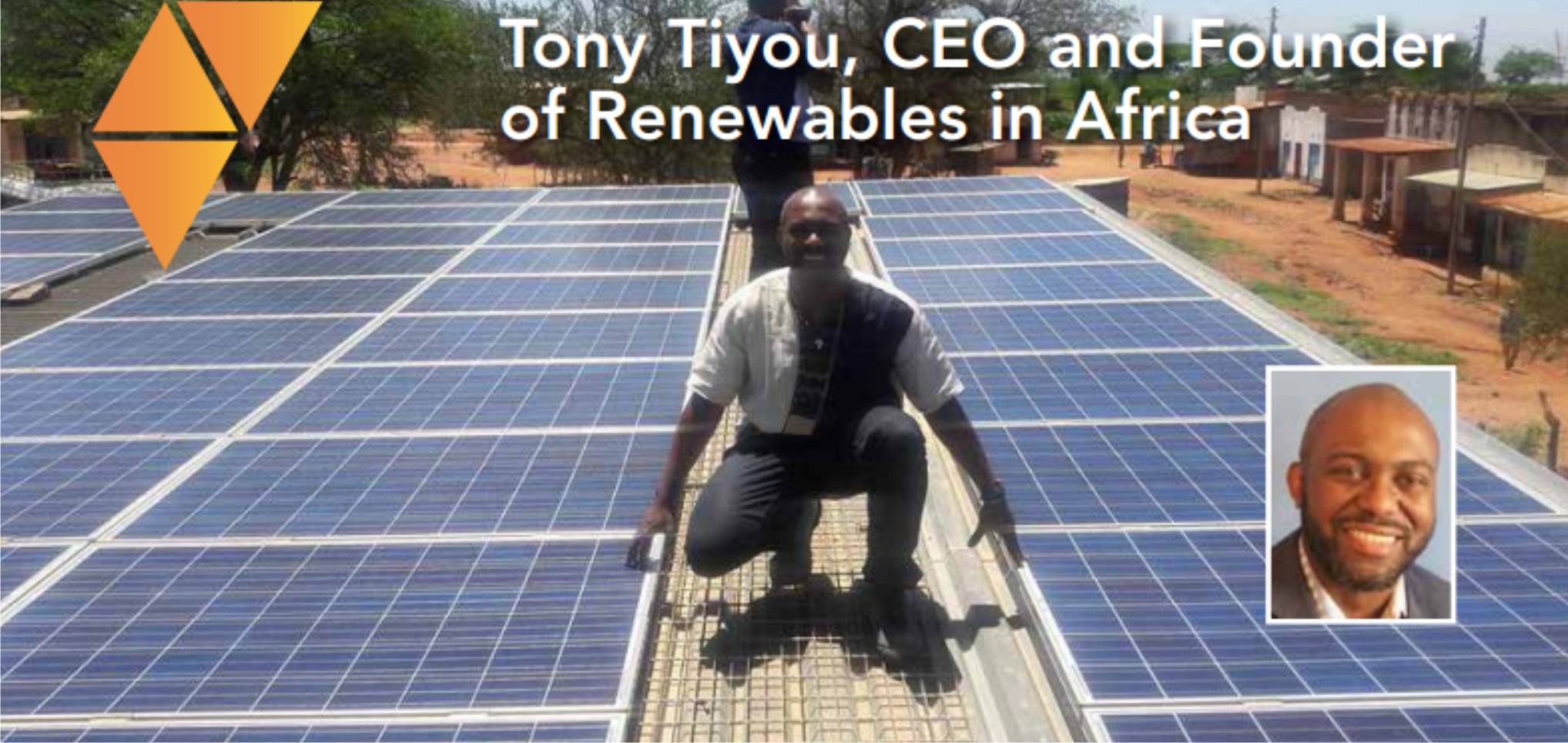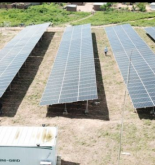CEO and Founder of Renewables in Africa Tony Tiyou shares his views on the state of the African renewable energy sector. Impending enthusiasm and an increase in the variety of funding seem to be two key factors moving the industry forward. And while green energy is taking big strides across the continent, South Africa, Kenya, Ghana and Nigeria continue to be the giants of the industry, with Ethiopia, the DRC and Sudan following closely.
What trends have you seen in the sector at the end of last year and the first days of 2020 in the renewable energy sector?
The sector can be divided in three areas, the solar home systems, the commercial and industrial market and the utility scale (with the mini-grid). Over the last two or three years we’ve heard a lot about solar home systems (SHS) and mini-grids (MGs). Large scale utility companies have been lagging behind, however towards the end of last year and the beginning of this year we’ve seen great momentum on large scale solar projects. From October last year until now we’ve been awarded about half a gigawatt of projects and about the same number of projects have signed PPA. We are seeing this across the whole of Africa, with the exception of South Africa. However, we absolutely know that big things are happening for South Africa too, as they will be launching their new bid window (Window 5) for the REIPP programme sometime this year. We are also seeing a lot more enthusiasm, for C&I markets and financing. New funders and different types of funding are coming into place. People also want to fill the gap for medium size projects, which is an area that is seeing some positive drive too. Certainly for RiA as we are currently pursuing 3 such opportunities in Central and West Africa on behalf of our clients.

Why is it in Africa’s best interest to focus on investment in renewable energy, compared to other continents?
We can agree than Africa is the minor contributor to climate change, while being the most affected by it. Nevertheless, we know climate change is a global issue, so everybody needs to put it their share of the work, regardless of how much they have being part of the problem. So when we look at Africa, most of it is about adapting solutions so that we can move into an energy transition. That requires a lot of investment, and there are lots of studies performed by institutions like the London Stock Exchange Group (LSEG) that demonstrated that between now and 2030, around 20 billion will be required annually. However, it has also been demonstrated that only 4% of the global finance goes towards investing in Africa’s energy transition. In order to fulfill what we need to enter this transition, investment from outside AND inside of Africa is absolutely necessary.
What are the African countries to keep an eye on, and the projects that have caught your attention?
I get this question a lot, and my answer always differs, because it depends on what people want, what is the risk appetite of the investor or the developer. If you’re looking for stability, then you need to look at countries where the market has been established for some time and where frameworks are in place. So that means South Africa, Morocco for sure, Kenya, potentially Ghana and Nigeria. Now, if you’re more focused on potential because you want to make big breakthroughs, never mind taking slightly more risks, then you need to gaze towards Nigeria again because that’s the giant of Africa, but you certainly should also be looking at Ethiopia, DRC: Congo, Sudan and so forth. These are countries with a large population, and clearly there’s a need for higher energy supply. As per projects, Scaling Solar is one of them. It was launched by the IFC, the private sector arm of the World Bank that puts together private sector, government, all the other stakeholders involved in the project development and implementation. This means you can develop your solar utility financial project at a much faster pace than what you would have done otherwise. They had contracts initially with four countries, Zambia, Senegal, Madagascar and Ethiopia. Since then, due to their success of the scheme, more countries have joined their program, such as Togo and Côte D’Ivoire.
Another initiative that we don’t talk enough about is Dessert-To-Power, launched by the African Development Bank and Africa 50. This initiative aims to accelerate economic development in the 11 countries of the Sahel region by adding solar energy generation capacity of up to 10 GW by 2025 through a combination of public and private interventions. These are two initiatives I would invite people to look at.
What is the role of RiA within the sector?
Renewables in Africa is a two-in-one company. We are a Clean Energy Engineering Consultancy, and a Media Platform at the same time. As a service provider, what we do is: we source projects for our clients, helping them reach Financial Close. We also provide Market Insights, through our webinars, workshops and industry reports. Our presence as a Media Platform is all about raising awareness on green energy projects, while fulfilling our mission’s backbone, which is to bring power to Africa.
What is the process you follow at Renewables In Africa when sourcing projects for clients?
What we’ve observe is that the current approach that we call “Ask-a-guy” is not efficient enough. We’ve gathered from data and information that investors and developers would usually spend about USD between USD 400, 000 to a million to source RE projects and for results that are not fantastic. At RiA we believe a different and more structured approach is clearly needed. The first thing that we do is agree with the client on the requirements they have. Then we deploy our team on the ground to source those opportunities for them, making sure we find something that meets the client’s needs. Once we have these opportunities, the client can then engage with the customer and start the process. Of course, finding a project doesn’t mean that you can develop it the day after, it just means you’ve found a good opportunity. You still have to go through the development stage, where you sign the right agreements, do the necessary studies where needed and ensure you have a good knowledge of the local environment and the industry within the continent. We would help our client to progress throughout all these stages, and ensure they establish the right connections in the country and get access to the right market insights to close the transaction.
What’s your involvement with the community?
Our first initiative towards reaching out to the community lies within our Media Platform, from where we can connect and speak to our audience right across Africa. We will engage on a number of issues that matter in the industry and play our role of the African Clean Energy Champion. Besides our activities that are unapologetically commercially driven, we also engage with a few NGO local partners helping African communities. One of them is Now For Them, a fantastic organisation that brings solar power into education in Botswana, and also Third Wave Volunteers, which is a much more global charity run by the amazing Dr Alison Thompson, based in Miami, but working across the globe. In fact Third Wave Volunteer gave me the opportunity in 2018 to participate for the first time in one of their humanitarian missions in Puerto Rico, to help vulnerable people affected by Hurricane Maria. It was an amazing experience on an amazing island. I am also the co-founder of a social enterprise called DIASIVI, which is all about educating young girls and young women in the DRC through the use of technology. Diasivi is currently collaborating with the foundation of the DRC’s first lady.

What exciting things are in the horizon for RiA?
This year is looking very promising to us. Right now, we are working on three really good opportunities. The first one is a trade mission in Uganda, in the Kingdom of Bunyoro Kitara more precisely. This region has recently has attracted headline due to new oil-fields recently discovered. His Majesty the King who has embarked on a transformational programme for his people and the Kingdom has invited us to organise a little trade mission and conduct a delegation of investors. Although our focus will be strongly Clean Energy, there will clearly be opportunities in other sectors like education, infrastructure, mining, etc. The mission will run from the 23rd Feb until the 28th of Feb and we welcome any interested party to reach out to us. The mission falls in line with our practice to take our clients to the discovery of opportunities on the ground. Last year for example, we were very successful in bringing a Indian solar company to Southern Africa. For the record, they were certainly very pleased about this trip as they made solid and concrete connections and partnerships and are about to seal the deal on a solar PV project.
Our other big projects for 2020 are our themed “Deal Sourcing in Africa” workshop in London on 3rd of April. We are planning on running two other sessions this year in Frankfurt and Paris. Later in the year we’ll be launching the second edition of our Solar Tracker, which tracks utility scale projects across the whole African continent. To add quickly an additional activity is our next “What is Best for Africa” WiBA Webinar on 13th of February. The topics will be on green banks in Africa. We are particularly proud to say that this conversation will be entirely led by women. From the moderation by our CFO Vanessa, to the panellists, it will be an all-female affair. I’ll happily take a back seat!
Source: EnergyNet






